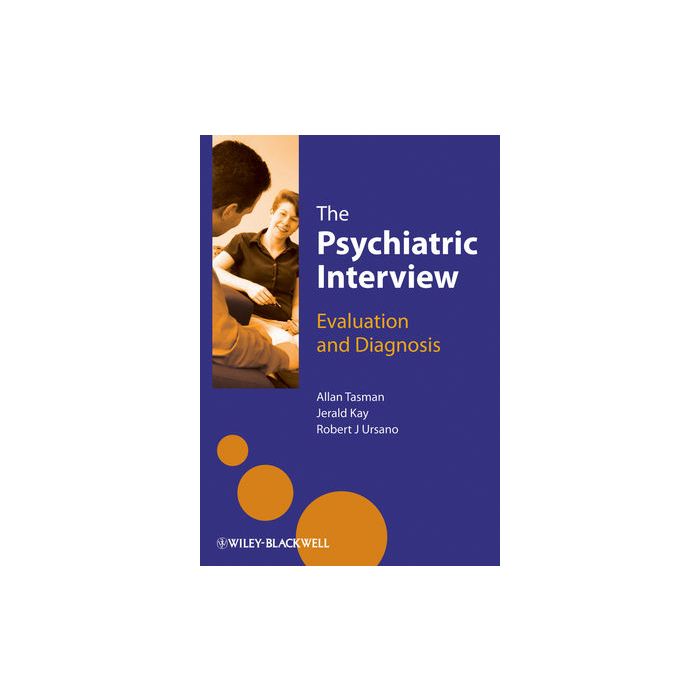The Psychiatric Interview: Evaluation and Diagnosis [Tasman - Wiley - Blackwell]

- ISBN/EAN
- 9781119976233
- Editore
- Wiley - Blackwell
- Formato
- Cartonato
- Anno
- 2013
- Pagine
- 208
Disponibile
61,30 €
The patient interview is at the heart of psychiatric practice. Listening and interviewing skills are the primary tools the psychiatrist uses to obtain the information needed to make an accurate diagnosis and then to plan appropriate treatment. The American Board of Psychiatry and Neurology and the Accrediting Council on Graduate Medical Education identify interviewing skills as a core competency for psychiatric residents.
The Psychiatric Interview: Evaluation and Diagnosis is a new and modern approach to this topic that fulfils the need for training in biopsychosocial assessment and diagnosis. It makes use of both classical and new knowledge of psychiatric diagnosis, assessment, treatment planning, and doctor–patient collaboration. Written by world leaders in education, the book is based on the acclaimed Psychiatry, Third Edition, by Tasman and Kay et al., with new chapters to address assessment in special populations and formulation. The psychiatric interview is conceptualized as integrating the patient’s experience with psychological, biological, and environmental components of the illness.
This is an excellent new text for psychiatry residents at all stages of their training. It is also useful for medical students interested in psychiatry and for practicing psychiatrists who may wish to refresh their interviewing skills.
Maggiori Informazioni
| Autore | Tasman Allan; Kay Jerald; Ursano Robert |
|---|---|
| Editore | Wiley - Blackwell |
| Anno | 2013 |
| Tipologia | Libro |
| Lingua | Inglese |
| Indice | Chapter 1 Listening to the Patient 1 Listening: The Key Skill in Psychiatry 1 The Primary Tools: Words, Analogies, Metaphors, Similes, and Symbols 3 How Does One Hear Words in This Way? 4 Listening as More Than Hearing 6 Common Blocks to Effective Listening 7 Crucial Attitudes That Enable Effective Listening 10 Theoretical Perspectives on Listening 14 Using Oneself in Listening 16 To Be Found: The Psychological Product of Being Heard 18 Listening to Oneself to Listen Better 20 Listening in Special Clinical Situations 23 Growing and Maturing as a Listener 26 Chapter 2 Physician–Patient Relationship 31 Formation of the Physician–Patient Relationship 34 Special Issues in the Physician–Patient Relationship 42 The Physician–Patient Relationship in Specific Populations of Patients 44 Conclusion 46 Chapter 3 The Cultural Context of Clinical Assessment 47 Introduction: The Cultural Matrix of Psychiatry 47 What Is Culture? 48 Culture and Gender 50 The Cultural Formulation 51 Ethnocultural Identity 52 Illness Explanations and Help-Seeking 53 Psychosocial Environment and Levels of Functioning 55 Clinician–Patient Relationship 56 Overall Assessment 57 Cultural Competence 57 Working with Interpreters and Culture-Brokers 60 Conclusion: The Limits of Culture 62 Chapter 4 The Psychiatric Interview: Settings and Techniques 65 Goals of the Psychiatric Interview 66 The Psychiatric Database 75 Database Components 77 Mental Status Examination 81 Conduct of the Interview: Factors That Affect the Interview 83 General Features of Psychiatric Interviews 85 Chapter 5 Psychiatric Interviews: Special Populations 103 Randon Welton and Jerald Kay Psychiatric Interview in Special Circumstances 104 Psychiatric Interview in Special Patient Populations 115 Conclusions 131 Chapter 6 Formulation 135 Allison Cowan, Randon Welton and Jerald Kay Biological Contributions 136 Social Factors 138 Psychological Factors 140 Summary 146 Chapter 7 Clinical Evaluation and Treatment Planning: A Multimodal Approach 147 Psychiatric Interview 147 Identifying Information 149 Chief Complaint 149 History of Present Illness 150 Past Psychiatric History 150 Personal History 150 Family History 151 Medical History 152 Substance Use History 152 Mental Status Examination 153 Physical Examination 157 Neurological Examination 158 Psychological and Neuropsychological Testing 159 Structured Clinical Instruments and Rating Scales 159 Laboratory Assessments 159 Neurophysiologic Assessment 159 Brain Imaging 162 Special Assessment Techniques 163 Assessment of Risk 164 Suicide Risk 164 Differential Diagnosis 167 Initial Treatment Plan 170 Conclusion 171 Chapter 8 Professional Ethics and Boundaries 173 Introduction 173 Ethical Behavior and Its Relationship to the Professional Attitude 174 WPA Guidelines on Euthanasia 176 WPA Guidelines on Torture 177 WPA Guidelines on Sex Selection 177 WPA Guidelines on Organ Transplantation 177 WPA Guidelines on Genetic Research and Counseling in Psychiatric Patients 177 WPA Guidelines on Ethnic Discrimination and Ethnic Cleansing 178 WPA Guidelines on Psychiatrists Addressing the Media 178 The Coherent Treatment Frame and the Role of Therapeutic Boundaries in Effective Psychiatric Treatment 178 Boundary Violations 179 Components of the Coherent Psychiatric Frame 180 Stability 181 Avoiding Dual Relationships 182 Autonomy and Neutrality 183 Coherent and Noncollusive Compensation 183 Confidentiality 184 Anonymity 184 Abstinence 185 Self-respect and Self-protection 186 Summary 187 Index 191 |
Questo libro è anche in:
